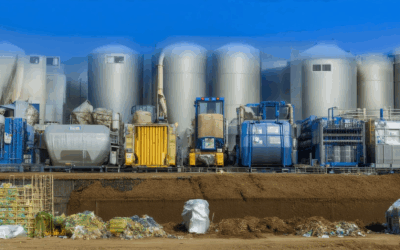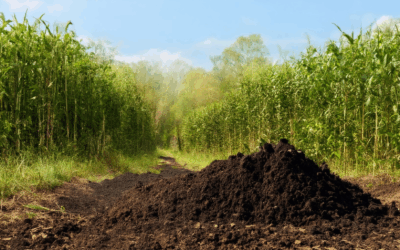Sustainable urban waste solutions are becoming increasingly essential as cities around the world grapple with the growing challenge of waste management in densely populated areas. With populations rising and waste generation rates escalating, traditional methods are proving inadequate, leading to environmental degradation and public health concerns. Cities worldwide are seeking innovative approaches to tackle this crisis, blending eco-friendly practices with modern infrastructure to create sustainable waste management systems. This article delves into the strategies, technologies, and practices that are transforming how urban areas handle waste, exploring everything from reducing waste generation to implementing cutting-edge waste-to-energy programs. By examining successful case studies and learning from both past mistakes and current successes, this exploration aims to shed light on the path forward for sustainable urban waste solutions.
Key Takeaways
– Effective waste segregation, recycling, and composting are foundational to sustainable urban waste management.
– Leveraging smart bins and IoT systems enhances efficiency and ensures timely waste removal.
– Public-private partnerships are essential for maximizing resources and expertise in waste initiatives.
– Recycling and composting facilities help reduce landfill dependency and lower environmental impact.
– Improved sanitation and waste collection improve community well-being and reduce disease risks.
– Adopting these strategies paves the way for a cleaner, healthier, and sustainable urban environment.

How Sustainable Cities Deal with Waste
Cities around the world are adopting innovative strategies to manage waste sustainably. Here’s a breakdown of effective approaches:
1. Reducing Waste Generation
- Promote bulk purchasing and packaging-free stores to minimize single-use plastics.
- Encourage citizens to adopt zero-waste lifestyles through refill stations and reusable products.
- Implement policies to ban single-use plastics in packaging and disposable goods.
2. Enhancing Recycling Programs
- Invest in advanced recycling infrastructure, including sorting facilities and processing centers.
- Launch public education campaigns to improve recycling rates and reduce contamination.
- Provide incentives for businesses and households to participate in recycling initiatives.
3. Expanding Composting Initiatives
- Establish city-wide composting programs for organic waste, turning it into nutrient-rich soil.
- Partner with local farms or gardens to distribute compost for agricultural use.
- Offer incentives or subsidies for homeowners and businesses to start composting.
4. Leveraging Technology
- Deploy smart waste bins with sensors to monitor fill levels and optimize collection routes.
- Develop mobile apps for waste tracking, enabling residents to report issues or check bin statuses.
- Use data analytics to identify high-waste areas and target interventions.
5. Engaging Communities
- Organize clean-up drives and awareness events to promote environmental responsibility.
- Collaborate with local organizations and schools to educate future generations on sustainability.
- Foster a culture of accountability by recognizing and rewarding eco-conscious citizens.
By combining these strategies, sustainable cities can significantly reduce waste, protect ecosystems, and promote long-term environmental health.
Most Sustainable Way to Dispose of Waste
The most sustainable approach to disposing of waste involves a combination of strategies that minimize environmental impact while maximizing resource recovery. Here’s a structured overview:
- Recycling :
- Recycling is a cornerstone of sustainable waste management. It reduces the volume of waste sent to landfills and conserves resources by repurposing materials into new products. Effective recycling programs separate materials like paper, glass, plastic, and metal, each requiring different processes to ensure sustainability.
- Composting :
- Composting organic waste, such as food scraps, yard waste, and certain papers, converts waste into nutrient-rich soil, beneficial for agriculture. However, not all waste is suitable for composting, particularly plastics and hazardous materials.
- Waste-to-Energy :
- While waste-to-energy plants generate electricity, they can produce emissions. This method is typically used as a supplementary strategy rather than a primary disposal method due to environmental concerns.
- Donating Usable Items :
- Donating goods instead of discarding them reduces waste and supports those in need. This approach aligns with social sustainability goals but requires individual effort beyond mere disposal methods.
- Landfill Diversion Programs :
- These programs aim to keep waste out of landfills by directing recyclables and compostables elsewhere. Proper management is essential to prevent environmental contamination.
By integrating these methods, we can effectively manage waste sustainably. Separating waste into recyclables, compostables, and landfill-bound items optimizes efficiency. Utilizing local facilities ensures adherence to regional guidelines, promoting a holistic approach to sustainability.
Advocating for improved waste systems and encouraging community participation are vital for scaling sustainable disposal practices. Together, these efforts contribute to a more sustainable future by minimizing environmental impact and promoting resourcefulness.

How Can We Reduce Sustainable Waste?
To reduce sustainable waste, consider implementing the following strategies:
- Reduce Consumption : Minimize unnecessary purchases and focus on buying items that can be reused or recycled. This includes avoiding single-use products like plastic water bottles and disposable goods.
- Reuse Materials : Find creative ways to repurpose items rather than discarding them. For example, turn old clothing into household items or use scrap materials for DIY projects.
- Recycle Responsibly : Ensure that recyclable materials are collected and processed properly. Familiarize yourself with local recycling guidelines to maximize efficiency.
- Compost Organic Waste : Composting kitchen scraps and yard waste reduces landfill waste and creates nutrient-rich soil for gardening.
- Support Sustainable Brands : Choose companies that prioritize eco-friendly practices, such as using biodegradable packaging or ethical sourcing methods.
- Participate in Waste Reduction Programs : Engage with local initiatives or community clean-up events to contribute to broader efforts in waste management.
- Use Public Transportation or Bike Sharing : Reducing reliance on single-use items like disposable batteries or gasoline-powered vehicles can lower overall waste generation.
- Minimize Packaging : Opt for products with minimal or recyclable packaging, particularly for frequently purchased items like groceries.
- Educate Others : Share knowledge about sustainable living and waste reduction techniques with friends, family, and colleagues to encourage collective action.
- Invest in Eco-Friendly Technologies : Support innovations like pyrolysis systems that convert organic waste into biochar, a versatile and sustainable resource.
By adopting these practices, we can work toward a more sustainable future while minimizing our environmental footprint. Remember, every small step contributes to a larger goal of preserving our planet for generations to come.

How to Manage Waste in Urban Areas
Effective waste management in urban areas requires a combination of strategies to minimize environmental impact and promote sustainability. Here’s a structured approach to addressing urban waste:
Overview of Urban Waste Management
- Importance of Effective Waste Management: Urban areas generate significant waste due to high population density and industrial activities. Proper management is crucial for public health, environmental protection, and resource conservation.
- Key Principles:
- Separation of waste into recyclables, compostables, and residuals.
- Reduction of waste generation through education and behavior change.
- Recycling and reprocessing materials to minimize landfill use.
- Composting organic waste to convert it into useful resources.
Strategies for Effective Waste Management
- Segregation at Source: Implementing waste segregation programs in households and businesses ensures that different types of waste are collected separately. This reduces the burden on landfills and allows for more efficient recycling and composting processes.
- Recycling Programs: Establishing robust recycling infrastructure collects and processes materials like paper, glass, metals, and plastics. Effective sorting and processing facilities are essential to maintain high-quality outputs.
- Composting Facilities: Organic waste from kitchens, gardens, and parks can be composted into nutrient-rich mulch. This not only reduces landfill waste but also enhances soil fertility and supports local agriculture.
- Waste-to-Energy Plants: Converting non-recyclable waste into energy through advanced technologies can significantly reduce landfill usage. However, emissions must be carefully controlled to mitigate environmental impacts.
- Improved Sanitation Infrastructure: Investing in modern sewage systems and public toilet facilities improves hygiene and reduces contamination of water bodies. Clean streets and proper waste collection services enhance community well-being.
Implementation and Best Practices
- Education and Awareness: Engaging residents in waste management practices through workshops and campaigns fosters long-term behavioral changes.
- Technology Integration: Leveraging smart bins and IoT-enabled waste monitoring systems optimizes collection routes and ensures timely waste removal.
- Public-Private Partnerships: Collaborating with local governments, NGOs, and private companies maximizes resource availability and expertise for waste management initiatives.
- Monitoring and Evaluation: Regularly assessing the effectiveness of waste management programs ensures continuous improvement and adaptability to changing needs.
By adopting these strategies, urban areas can achieve sustainable waste management, contributing to a cleaner, healthier, and more resilient environment for future generations.
Problem with Urban Waste Management
Urban waste management faces several critical challenges, primarily due to rapid population growth, industrialization, and consumer behavior. These challenges include:
- Overwhelmed Infrastructure : Rapid urbanization leads to increased waste generation, overwhelming existing infrastructure. Many cities struggle with insufficient landfill capacity, leading to overflows and unsightly dumpsites.
- Inefficient Collection Systems : Insufficient waste collection vehicles and routes result in delayed pickups and accumulated garbage in public areas, affecting aesthetics and health.
- Lack of Processing Capacity : Advanced recycling and treatment facilities are often absent, leading to improper disposal and higher emissions from incinerators.
- Aging Infrastructure Decay : Old facilities cannot handle modern waste volumes, risking leaks and contamination.
- Public Health Risks : Poor management can spread diseases via contaminated water or soil and attract pests, impacting public health.
- Financial Constraints : High costs for modern systems strain city budgets, delaying necessary upgrades and leading to long-term issues.
To address these challenges, solutions include investing in technology like advanced sorting systems and composting facilities, promoting recycling through policies, and fostering community engagement. Examples like Singapore and Tokyo demonstrate successful models, though implementation requires significant investment and expertise.
By combining technological innovations, policy reforms, and community initiatives, cities can enhance waste management, mitigate environmental impacts, and improve public health.

Strategies to Minimize Waste
Minimizing waste involves adopting sustainable practices that reduce, reuse, and recycle materials effectively. Here are three key strategies:
- Reduce: Conserve resources by using less water, energy, and materials. Turn off lights, unplug appliances when not in use, and opt for public transportation or carpooling.
- Reuse: Find creative ways to use items again. Repurpose jars, bottles, or clothing into new purposes. Donate unwanted goods to local charities instead of discarding them.
- Recycle: Properly dispose of materials that cannot be reduced or reused. Familiarize yourself with local recycling guidelines to ensure items are processed efficiently and avoid contamination.
By implementing these strategies, we can significantly reduce our environmental footprint and promote a more sustainable lifestyle. For more tips and resources on minimizing waste, visit our website .
Conclusion
Adopting these strategies not only helps protect the planet but also fosters a culture of responsibility and innovation. By thinking critically about how we use and discard materials, we can contribute to a healthier Earth for future generations.




0 Comments